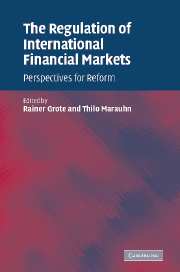Book contents
- Frontmatter
- Contents
- Notes on contributors
- Preface
- List of abbreviations
- Introduction: the regulatory dilemma in international financial relations
- PART I An historical perspective
- PART II A comparative perspective
- PART III A public international law perspective
- 5 The regulation of financial services in the European Union
- 6 The free movement of capital in the European Union
- 7 International regulation of finance: is regionalism a preferred option to multilateralism for East Asia?
- 8 WTO rules on trade in financial services: a victory of greed over reason?
- PART IV An institutional perspective
- PART V A policy perspective
- Conclusions and agenda for further research
- Index
8 - WTO rules on trade in financial services: a victory of greed over reason?
Published online by Cambridge University Press: 08 July 2009
- Frontmatter
- Contents
- Notes on contributors
- Preface
- List of abbreviations
- Introduction: the regulatory dilemma in international financial relations
- PART I An historical perspective
- PART II A comparative perspective
- PART III A public international law perspective
- 5 The regulation of financial services in the European Union
- 6 The free movement of capital in the European Union
- 7 International regulation of finance: is regionalism a preferred option to multilateralism for East Asia?
- 8 WTO rules on trade in financial services: a victory of greed over reason?
- PART IV An institutional perspective
- PART V A policy perspective
- Conclusions and agenda for further research
- Index
Summary
The liberalisation of regulations concerning financial services and the pertinent industries do not seem particularly de rigueur as of now, i.e. the end of 2002. Most of the OECD members, in particular the countries of the Triad, experience what many people think feels, smells and quacks ‘just like’ a recession. Although the stock markets reached their climax only in 2000, it seems like a century ago. The rock-star status of the movers and shakers of the financial industry has vanished like the picture of Dorian Gray. Liberalisation of international trade in services means, one way or the other, lesser and less infringing government regulations, doesn't it? If you want to win an election these days, be it in America or in Europe, this is not ‘platform material’. Nevertheless, this is exactly what Article XIX of the GATS calls for:
‘(1) … Members shall enter into successive rounds of negotiations, beginning not later than five years from the date of entry into force of the WTO Agreement and periodically thereafter, with a view to achieving a progressively higher level of liberalization … (4) The process of progressive liberalization shall be … directed towards increasing the general level of specific commitments undertaken by Members under this Agreement.’
Indeed, the European Community (very much like the United States and other major trading nations) seems to take that obligatio de negotiando seriously:
‘[T]he EC is seeking in the current GATS negotiations to remove significant restrictions on the establishment of companies in the whole financial services sector, to liberalise cross-border trade on certain activities, such as reinsurance and provision of financial information, and to encourage regulatory frameworks underpinning market access commitments.’
- Type
- Chapter
- Information
- The Regulation of International Financial MarketsPerspectives for Reform, pp. 176 - 206Publisher: Cambridge University PressPrint publication year: 2006
- 1
- Cited by



